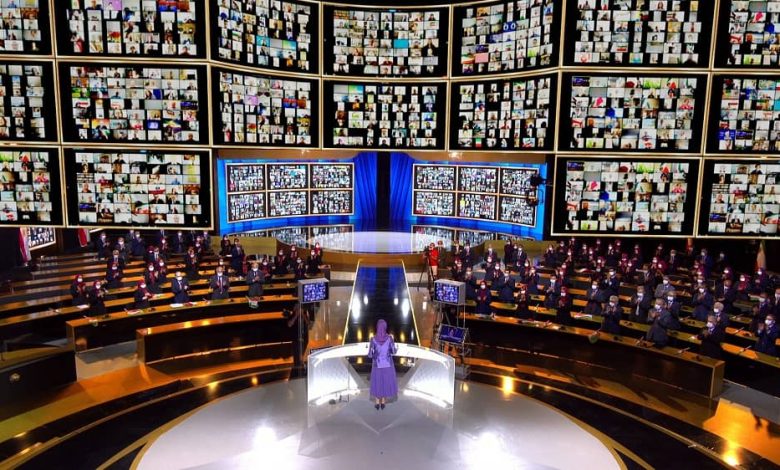Free Iran 2022: At Time of Crisis, Iranian Resistance to Again Outline Prospective Changes in Iran Policy

Written by
Mehdi Oghbai
This Saturday and Sunday, the National Council of Resistance of Iran will be holding its annual “Free Iran Summit” to discuss the prospects for regime change and to promote more assertive policies for dealing with the Iranian regime on the world stage. The event will be live-streamed to a global audience numbering in the tens of thousands and will feature speeches from Iranian activists and a wide range of the coalition’s political supporters. It comes at a time when various conflicts between Tehran and its foreign adversaries are deepening and is therefore well-positioned to highlight the failures of preexisting policies in the US and Europe.
The Iranian regime has been experiencing nearly constant unrest since the end of 2017. That December marked the systematic outbreak of protests over the state of the economy, which steadily took on a more political tone involving explicit demands for regime change and “death to the dictator”. By mid-January 2018, the resulting uprising encompassed well over 100 cities and towns, and the regime’s Supreme Leader Ali Khamenei was compelled to acknowledge the leading role played by the People’s Mojahedin Organization of Iran (PMOI/MEK).
Since then, the MEK’s “Resistance Units” have repeatedly broadened their strategies against the regime and its propaganda while encouraging the Iranian people to continue rising up. In February, one such direct action collective set fire to a newly-unveiled statue of Qassem Soleimani, the head of the Islamic Revolutionary Guard Corps’ Quds Force, who had been eliminated two years earlier. The immediate defiance of Tehran’s efforts to promote his legacy marked a new escalation in longstanding efforts to destroy images supporting the regime’s claims of outsized power and domestic support.
In the months following the statue’s immolation, MEK-linked activists gained control of state media broadcast signals, ministry websites, and other systems that permitted them to disseminate their message condemning the theocratic dictatorship and calling for a democratic future for the country.
On Monday, an Iranian official publicly declared that the Iranian regime already has the capability to build a nuclear weapon, though he also repeated that claim that it does not aim to do so. The forthcoming summit will no doubt emphasize how foolish it is to take the Iranian regime at its word on such matters, or indeed on any matters. The event also comes at a time when the Belgian government is mulling the decision to enact a treaty with Iran that would allow citizens of either country to return home if they have been sentenced to prison in the other. The treaty is undoubtedly intended to facilitate a prisoner swap involving Assadollah Assadi, an Iranian terrorist who was arrested in 2018 while operating in the guise of a diplomat.
The treaty is presumably being sold to would-be supporters as a means of securing the freedom for one or more European nationals while still demanding accountability for proven crimes. But it would be the height of naivety to expect the Iranian regime to continue implementing Assadi’s well-earned 20-year sentence after he returns home. In fact, the treaty in question even includes language allowing either signatory to commute a transferred prisoner’s sentence in line with “its laws and its constitution”. Tehran has repeatedly signaled that it would free Assadi at the earliest opportunity since it considers his diplomatic status to entitle him to blanket immunity.
This is a bold claim under any circumstances, but especially in light of the seriousness of the charges levied against Assadi. His arrest on July 1, 2018, came a day after two agents in his employ were caught attempting to transport 500 grams of the high explosive TATP across the border from Belgium to France. Assadi had personally provided them with those explosives and a detonator and instructed them to set off the bomb close to the stage where Mrs. Rajavi was to speak during that year’s Free Iran Summit, held just outside Paris.
Fortunately, this terrorist plot was thwarted, but it had the potential to be the worst ever attack on European soil, and it revealed that Assadi had developed contacts with dozens of other agents spanning much of continental Europe. In the aftermath, many politicians understandably criticized Western policymakers for their failure to demand broader accountability, especially following the Belgian court’s confirmation that Assadi had been acting upon orders from some of the highest officials in the clerical regime.
Such short-sightedness is just another consequence of the preexisting Western tendency toward appeasement of the Iranian regime. The Free Iran Summit will provide a window into this and other such consequences, as well as a pathway for how to begin reversing them. It will also give the Iranian people much-deserved credit for beginning that process on their own, and continuing their struggle for regime change and democratic transition even in the face of overwhelming repression such as the mass shootings that killed 1,500 peaceful protesters during an uprising in November 2019.
Such repression has failed and continues to fail. But to get Iran over the finish line, it may be possible to exert pressure on the mullahs’ regime from both inside and outside the country. The incentives for the Iranian people to act have always been obvious, and the incentives for the international community should have become obvious long ago, as well. But now those incentives should be positively impossible to ignore, in the face of Iran’s persistent obstruction of nuclear negotiations, its claim of imminent nuclear “breakout”, its commitment to hostage-taking and foreign terrorism, and its demands for impunity in these and other matters.
Appeasement has failed, so it is long past time for Iran’s policy to change. The proper approach to that change will be outlined in detail this weekend, and anyone with an interest in democracy or the welfare of the Iranian people should pay to listen to what the speakers in this weekend’s summit will have to say.

